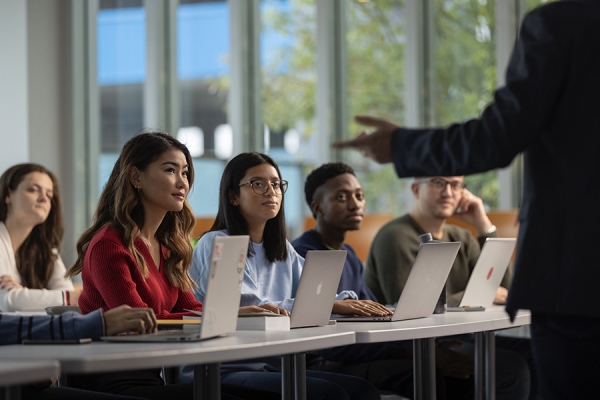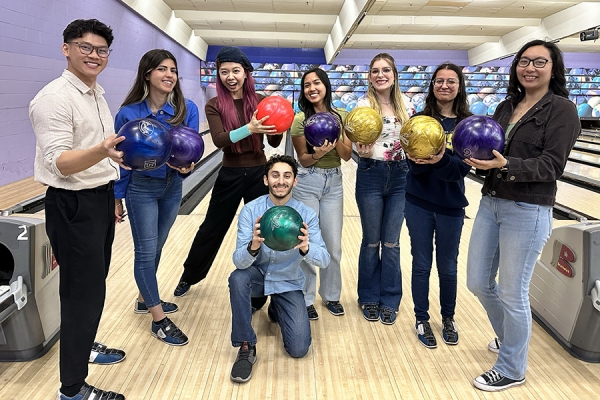 Professors Arezoo Emadi, Mike McKay, Kendall Soucie, and Kenneth Ng are pictured along the Windsor-Detroit riverfront, showcasing the interdisciplinary team leading the $15 million INSPIRE project to advance Canada’s biomanufacturing and pandemic response capabilities.
Professors Arezoo Emadi, Mike McKay, Kendall Soucie, and Kenneth Ng are pictured along the Windsor-Detroit riverfront, showcasing the interdisciplinary team leading the $15 million INSPIRE project to advance Canada’s biomanufacturing and pandemic response capabilities.
The University of Windsor is leading a $15 million research project to help Canada respond to future pandemics by strengthening our country’s biomanufacturing sector.
INSPIRE, short for the Integrated Network for the Surveillance of Pathogens: Increasing Resilience and Capacity in Canada’s Pandemic Response, brings together 43 experts from seven universities and public and private agencies in Canada and the United States. This team of microbiologists, biochemists, engineers, computer scientists, and experts in supply chains and public policy will look for ways to improve biomanufacturing and health sector supply chains, bolster cross-border trade and mobility, and explore new technologies in pathogen surveillance.
“During the COVID-19 pandemic, we had supply chain shortages, we couldn’t get enough PPE in Canada, we weren’t making our own vaccines,” said Great Lakes Institute for Environmental Research director Mike McKay, who is leading INSPIRE together with a researcher from the University of Guelph.
Dr. McKay is a founding member of the Ontario Wastewater Surveillance Initiative. During the pandemic, his research group tested sewage for the COVID-19 virus, providing an early warning system for outbreaks.
“We need to shore up the ability of the private sector in Canada to meet demands of the health sector in case of another pandemic,” he said. “We must learn from experience to develop proactive strategies to prevent the devastating impact of infectious diseases on the biomanufacturing and health sectors and improve efficiencies moving assets across borders.”
Funding for INSPIRE was part of an announcement Monday by federal tourism minister Soraya Martinez Ferrada, also minister responsible for the Economic Development Agency of Canada for the Regions of Quebec. On behalf of François-Philippe Champagne, minister of innovation, science and industry, and Mark Holland, minister of health, Ferrada announced nearly $574 million in funding for 19 projects.
“The projects that we’re supporting today will strengthen our ability to supply medicines, vaccines, and therapeutics for the benefit of Canadians,” Ferrada said. “These collaborations between research hubs, post-secondary institutions, and research hospitals will foster innovation across the country. Thanks to the work of experienced scientists in institutions at the cutting edge of innovation, Canada will be ready to respond to future health priorities.”
Shanthi Johnson, UWindsor vice-president – research and innovation, said she is deeply grateful for the confidence the government is placing in the University by funding INSPIRE.
“This announcement speaks to our local to global scale expertise, experiences, and excellence in research and innovation within the University of Windsor, our ability to engage a diverse cadre of experts and trainees, and collaborate with other universities, community, and industry partners throughout the province and in the United States,” Dr. Johnson said.
“INSPIRE is an important initiative with the significant potential to improve the lives of Canadians.”
INSPIRE is being funded through the Canada Biomedical Research Fund and the Biosciences Research Infrastructure Fund. Earlier funding established five research hubs across the country. The Canadian Hub for Health Intelligence and Innovation in Infectious Diseases, housed at the University of Toronto, endorsed the UWindsor application for INSPIRE and is helping to facilitate networking with the other hubs.
INSPIRE will develop strategic partnerships with researchers in Michigan, Ohio, and New York to create a cross-border pathogen surveillance network covering regions where many supply chains supporting Canadian industry originate.
Those supply chains will be the focus of the Supply Chain Advancement Network in Health (SCAN Health), led by CEO and scientific director Anne Snowdon, a professor in the Odette School of Business. SCAN Health designs, validates, and scales collaborative supply chain solutions, practices, and measurement tools to improve health system supply chain resilience and economic recovery in Canada's post-pandemic future, Dr. Snowdon said.
“Through our engagement with INSPIRE we will mobilize the collective expertise of healthcare supply chain stakeholders across Canada to gain a real-world understanding of the implications of a potential pathogen outbreak, to inform solutions that improve health system capacity, and support the biomanufacturing sector to strengthen self-reliance and economic recovery,” she said.
Other UWindsor researchers involved in the project include chemistry and biochemistry professors Kenneth Ng and Yufeng Tong, psychology professor Kendall Soucie, computer science professor Pooya Moradian Zadeh, engineering professor Arezoo Emadi, biomedical sciences professor Lisa Porter, and Bill Anderson and Marta Leardi-Anderson of the Cross-Border Institute.
The Cross-Border Institute will study Windsor-Essex’s location in terms of potential biothreats entering Canada. It will focus on optimizing cross-border policies and programs to make Canada a more attractive destination for life sciences companies.
Local partners include the WE-Spark Health Institute, the Windsor-Essex County Health Unit, and the Municipality of Leamington. Key cross-border partners include the City of Detroit’s Great Lakes Water Authority, the Ohio Department of Health, and the Great Lakes Center for Fresh Waters and Human Health.
Lawrence Goodridge, professor of food science at the University of Guelph, is McKay’s co-director on INSPIRE. Also involved are researchers from the University of Toronto, the University of Waterloo, York University, Ohio’s Bowling Green University, State University of New York at Buffalo, and Canadore College.
Funding for INSPIRE includes $2.5 million for new equipment, including a mobile lab that will allow teams to analyze samples at remote locations.
The project will also offer unique training opportunities for graduate students who will be able to rotate between research locations.









